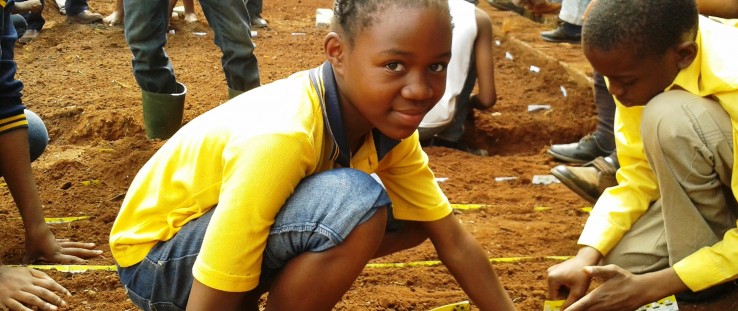 Students at Ndlelenhle Primary School in Vosloorus, Gauteng, plant Reel Gardening seeds.
Reel Gardening
Students at Ndlelenhle Primary School in Vosloorus, Gauteng, plant Reel Gardening seeds.
Reel Gardening
 Students at Ndlelenhle Primary School in Vosloorus, Gauteng, plant Reel Gardening seeds.
Reel Gardening
Students at Ndlelenhle Primary School in Vosloorus, Gauteng, plant Reel Gardening seeds.
Reel Gardening
Speeches Shim
Unlike most girls her age who work as a waitress or at other part-time jobs in Johannesburg, 16-year-old Claire Reid spent her time diligently working on ideas to grow vegetables in her backyard to make extra income.
Her family lived in a house with a small garden in the Parkhurst neighborhood in the north of Johannesburg with only 2 square meters of land suitable for growing vegetables. Reid had no interest in gardening, but her dad wanted to encourage her to spend more time outside. So he said that, if she grew vegetables, he would buy them from her so she could make some pocket money.
The first attempt didn’t go well. Reid was required to purchase more seeds and fertilizer than she needed to plant her vegetable garden. She’d purchased a packet with 400 seeds, but really only needed three. She also balked at the large amount of water and raw materials needed—and often wasted—during gardening.
As an untrained gardener, Reid ran into other problems: She had no idea how far apart the seeds should be planted or how deep into the soil the seeds should sit. She asked for help from a fellow failed gardener, her nanny Meggie Masilo.
She too had tried to start a vegetable garden and her struggles mirrored Reid’s, compounded by the fact that she could not read the instructions on the back of the seed packets, which were in English—not her first language.
Despite their vastly different socioeconomic backgrounds—Reid was a middle-class English girl and Masilo was originally from the rural mining town of Rustenburg in the North West province—both of them were experiencing the same challenges when it came to growing food.
After her frustrations with the initial gardening methods, Reid continued to experiment with new ways of making planting easy. She used newspapers, flower seeds, fertilizers and liquid glue to develop a seed strip that could be used for planting. She entered this crude first attempt in the Eskom Expo for Young Scientists and won. Then she won other competitions, including the Stockholm junior water prize. She further developed the methodologies working with the University of Pretoria and subsequently conducted scientific research and testing.
Fast forward six years. Reid was a junior architect working with Anglo American, a multinational mining company that wanted to include simple gardens as a way to make miners’ housing more homely. Reid’s gardening idea reemerged as Reel Gardening, which she presented to Anglo Zimele, an enterprise development initiative that provided her with a small business development loan. Reel Gardening was born.
Registered in 2009, the company currently has 10 staff members that work in production, marketing and the development sector, which services school-growing programs.
Dubbed “Garden in a Box,” Reel Gardening includes pre-fertilized, biodegradable paper tape that encases seeds at the correct distance from each other and anchors them at the correct depth in the soil for optimum germination. After the bottom edge of the tape, containing the seeds, is placed in the soil, the top edge of the tape remains above the ground, so gardeners can see exactly where the plant will grow. Allowing the gardener to see exactly where to water saves 80 percent of water in the germination phase. Since its inception, Reel Gardening is estimated to have saved 19.5 million liters of water.
In 2014, Reel Gardening was selected as one of 17 awardees of the Securing Water for Food: A Grand Challenge for Development, which aims to help accelerate and expand startups with innovations to produce more food with less water, and to make more water available for food production, processing and distribution. Reel Gardening was awarded a scale grant of $500,000 to allow production testing at scale over three years.
“Little did I know,” says Reid, “but it was the start of one of the most amazing journeys, which has seen us grow as both a company and individuals in a nurturing environment, which challenges us to be better every day.”
Reel gardening could be an answer to some of the food security challenges South Africa is facing today. In the past few years, climate change conditions have made it impossible for commercial farmers to produce food to feed the nation and also export to other countries. This is mainly due to less rainfall and drought in many areas designated for agricultural produce.
According to Grain SA, an association of South African grain farmers, of the maize consumed in the Southern African Development Community, 40 percent is produced in South Africa. Therefore, lower local production has a significant impact on the region.
South Africa will import an estimated 5 million tons of maize between May 2016 and April 2017, which will weigh heavily on the trade deficit. Import estimates are based on the fact that farmers have planted 1.3 million hectares of maize in the planting season, half of the usual 2.6 million hectares. The shortage of agricultural produce has rapidly increased basic food prices, making them unaffordable for many households.
Reel Gardening products are now easily accessible, sold nationwide at Food Lovers grocery stores and through the Reel Gardening and TakeaLot online stores. Prices range between $1.40 and $80 (about 20-1,140 South African rand). The boxes are packaged according to season, which makes it easier for garden novices to use. And a children’s version is also available.
“Securing Water for Food innovator Reel Gardening has made meaningful pivots in their business model, identified what’s needed for long-term sustainability, and is actively harnessing the power of messaging, communication and branding to support a planting revolution,” said Donna Vincent Roa, chief of party for the Securing Water for Food Technical Assistance Facility. “The management team brings the right energy and focus to connect with influencers globally and to bring about social change and development impact in South Africa and beyond.”
Watching Their Gardens Grow
Joel Mnisi of Withok Estates in Brakpan, an old urban gold and uranium mining town in Gauteng, is among more than 300,000 people who have tried the Garden in a Box. He heard about it while he was developing a fresh produce business to sell to the local community. Reel Gardening staff trained him on how to use the new methodology, and he began to see positive yield results in no time.
“We have grown before, but we have never seen anything like this. We learnt many new things from Reel,” he said.
The boxes are also being used in 200 schools, mainly in the Gauteng and Western Cape provinces, and created full-time jobs for previously disadvantaged women, who put the tapes together and packaged them for distribution and sales.
Reel Gardening has also expanded beyond South Africa’s borders. It’s already selling in Dubai. Backers are also working to target the U.K. market, and have their sights set as far as the United States and Japan.


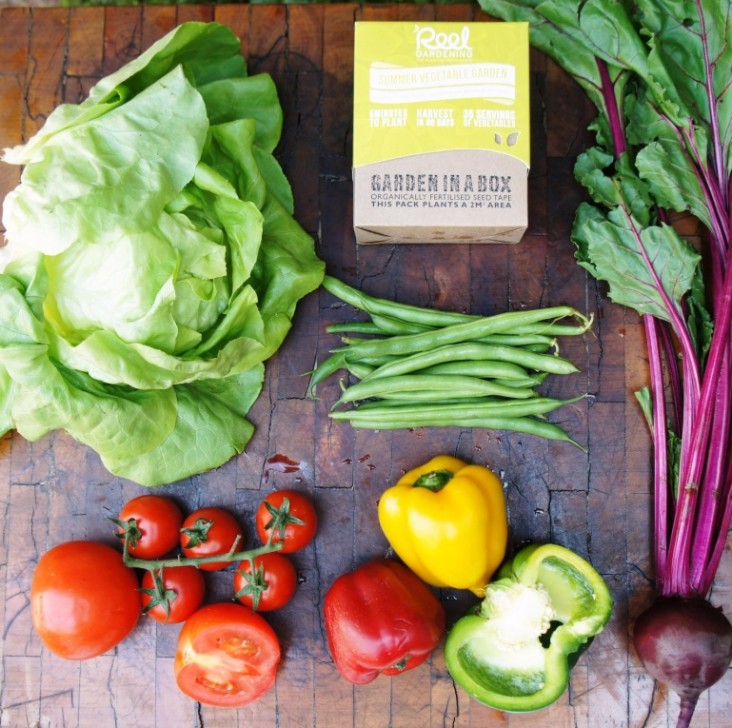
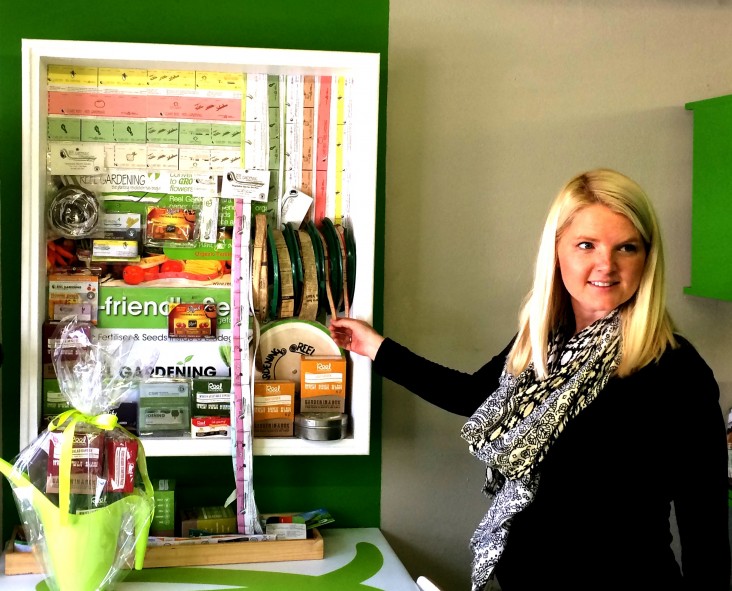
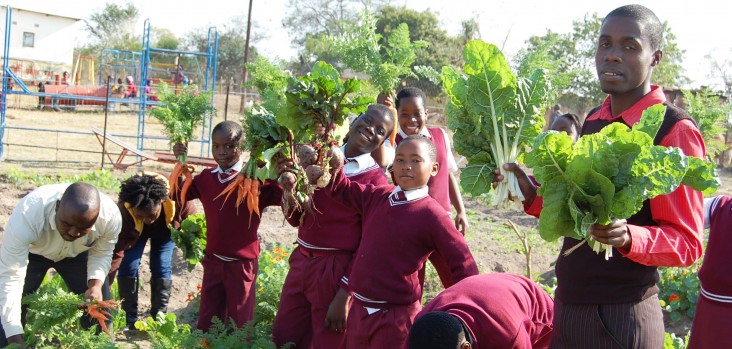
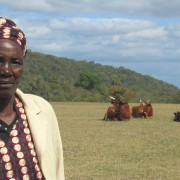
Comment
Make a general inquiry or suggest an improvement.